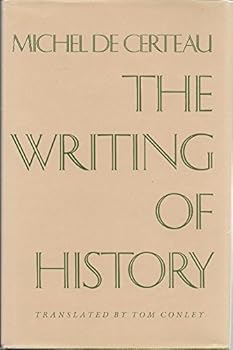The Writing of History
Select Format
Select Condition 
Book Overview
A leading intellectual member of France's Freudian school, Michel de Certeau combined principles from the disciplines of religion, history, and psychoanalysis in order to redefine historiography and... This description may be from another edition of this product.
Format:Hardcover
Language:English
ISBN:0231055749
ISBN13:9780231055741
Release Date:January 1988
Publisher:Columbia University Press
Length:368 Pages
Weight:1.60 lbs.
Customer Reviews
2 ratings
Influential Postmodern, Christian Historiography
Published by Thriftbooks.com User , 20 years ago
This work is one from which a great many specialists from different fields will draw much insight from. Though ostensibly a work on historiography, this meta-topic is explore through the various alleyways of other disciplines such as politics, theology, history of religions, ethnology and psychoanalysis. Its diverse topics reflect the diverse interests of its author. Undoubtedly, the fascination with ethnology is a reflection of de Certeau's earlier aspirations to be a Jesuit missionary to China. Part of this work bears the mark his interests while pursuing his doctoral degree at the Sorbonne where he studied the origins of the Jesuit order in the 17th century. This is a disparate book, made of disjointed sections, which only interact with each other loosely under the umbrella of `historiography'. The first part of the book is more focused on historiography proper-the nature of making history and the making of history that necessarily occurs from the `place' of the historian and is shaped by his `archive'. In the following section, details of 17th century European religion serve as the locus of a larger discussion on what it means to write a religious history and a history of religion-elucidating the relation between ideology and religious belief. Then the transition is made to concerns of ethnology, alterity and semiotics in the economy representation and its narrative. The book concludes with a discussion of Freud and religion, taking on the two subjects of his approach to possession and his work Moses and Monotheism.The general conclusion of the work is that a self-/place-conscious history is best (one that is not blatantly ideological and one that is not naïvely positivistic either) through throughout the course of the book many other theme, sub-themes, etc. are unpacked. Though average length, it's a dense work bound to effect how anyone who reads it writes, approaches, and understands narratives of the real.
Excellent for those interested in historiography and theory
Published by Thriftbooks.com User , 22 years ago
Along with French intellectual giants such as Lacan, Foucault, Derrida and Levinas, stands Michel de Certeau. Despite being far less kown than these other figures of post-structuralist thought, it has been said that his thought and range of interests exceeded all of them (He studied and taught history, anthropology, sociology, psychoanalysis, theology, literature and French). He deserves to be better well-known in the English speaking world, and will undoubtedly become so, now that his major works have been translated and are available.This book, The Writing of History, is where de Certeau deals most comprehensively with post-structuralist theory and history, or, more specifically, historiography. Although American academia is still very hesitant about anything smacking of "postmodernism", it is inevitable that they too will have to acknowledge the sea change taking place, and find a place or at least a thought-out response to, theory. Despite definitely locating itself within the post-structuralist camp, de Certeau's work offers a way forward that is neither repulsive nor irrational, but can in fact be seen as liberating and promising. He argues that historians have worked on a principle of exclusion, whereby they draw an artificial line between the past and present, and separate what is "dead" from what is not. Through this navigation, they neglect the fact that they themselves are historical beings - they fail to historicize themselves and to recognize fully the ways in which historical processes shape their own actions, their own writing. They also believe - wrongly - that they are somehow above "politics", and that they may be able to describe politics without being themselves implicated in political processes. Even Foucault, de Certeau argues, fell victim to this trap (see Birth of the Clinic) since he attempts to point out the fundamental basis for knowledge systems without addressing his own basis.De Certeau's thought cannot be summarized here. I would encourage this book to all historians who are not theory-phobic, especially those who are interested in the possibilities of thinking about ethics and history together (de Certeau is influenced by Levinas, here). Not many are doing this today, and it is a topic worth exploring more fully, especially as we wrestle with problems in the historiography of the holocaust, genocide, oppression, and other important issues.





